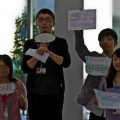What’s Article 6?
Andres Fuentes | December 6, 2012.

The UN climate change negotiations in Doha, Qatar have put education, and the work of Article 6, into the spotlight. Article 6 is designed to foster action to develop and implement educational and training programmes on climate change, with the British Council’s International Climate Champion program being one example.
Climate change education is a multidisciplinary area that includes the science, local and global ramifications, adaptation efforts and mitigation work. Each of these areas is key to ensuring a successful outcome to the fight against climate change.
Climate science and the effects of climate change are an essential element as we prepare future generations to manage the causes and effects of climate change. A solid understanding of the science is needed before people are able to fully comprehend how their decisions impact the planet.
Adaptation education can include how to adapt to changing farming practices or what to pack in a disaster survival kid. This is key in ensuring that people all over the world can cope with the increasingly volatile weather patterns.
Education on mitigation and how to reduce our impact will be key if we are to keep global warming to two degrees. Mitigation education can include the promotion of energy conservation, the use of public transportation and prevention illegal logging.
Article 6 negotiations were wrapped up last Saturday, with the new and finalised text including specific mentions of civil society involvement during the implementation phase.
The youth lobby, YOUNGO, have had a strong presence since Cancun in pushing forward the importance of education and capacity building in the formal negotiations.
By Andrés Fuentes, photo by Linh Do.











comment